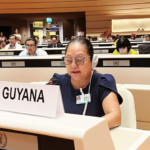
By Svetlana Marshall
The President of the Amerindian Peoples Association (APA), Mario Hastings, slammed the Government of Guyana and its respect for the rights of Indigenous people as he addressed the United Nations (UN) Permanent Forum on Indigenous Issues. He told the Forum on Wednesday that the actions of the Government of Guyana directly violate the rights of Indigenous people to self-determination, particularly over the use of their lands.
Adding his voice to the dialogue on the financing of Indigenous Peoples’ work and participation across the multilateral and regional system, Mr. Hastings explained that despite having titles to their lands, Indigenous People in Guyana are powerless with regards to the use of their lands by the State or even private companies.
“In Guyana, Indigenous Peoples, despite having titles to our lands, have no ownership over the resources from them, nor are we consulted when these resources want to be exploited by companies or our government,” Hastings told the Indigenous Leaders present.
In an attempt to address the repeated violations, the APA has been lobbying the Government to reform the laws and practices governing Indigenous Peoples. The APA President said despite adopting the United Nations Declaration on the Rights of Indigenous Peoples, those laws remain unamended.
He said it is no secret that the people’s right to free, prior, and informed consent (FPIC), is still not respected, or required in the laws.
“Government actions directly violate our collective rights to self-determination and our land. Therefore, stronger incorporation of the UNDRIP would increase the protections of our rights and ensure that they are respected and upheld, rather than overridden by corporate or state interests,” the APA President said.
Further, he told the UN forum that while the Guyanese Government speaks glowingly about the benefits deriving from the sale of carbon credits under the Low Carbon Development Strategy (LCDS), with Indigenous communities receiving billions of dollars in funding, an important element is omitted.

“The processes arriving to this agreement were deeply flawed. Again, we were not properly consulted in how our forests and lands would be used in this scheme. We were not allowed to consent to this programme with the mandate of our people. And, we were not part of any negotiations to determine how our peoples could have benefitted from the national initiative according to our needs prior to the carbon sales agreement,” he explained.
Hastings said their sacred lands that have been handed down through generations with care and reverence are now being stripped, and the rivers poisoned. He added that the environment is being desecrated in the name of extractive industries and profit.
“Chair, we are witnessing the reckless seizure of our lands and resources without a seat at the decision-making table to avoid the devastation that such actions can cause. All this is justified in the name of economic development, without our participation, while fostering division among our peoples,” he said.
The APA used the forum to call on the Government of Guyana to take tangible steps towards the revision of the 2006 Amerindian Act, and incorporate the articles of the UNDRIP into the national laws to ensure the protection of Indigenous peoples in the face of growing threats from the old and new extractive industries.
It urged the government act on the recommendations made by Villages and District Councils for amendments to the Act in the national revision process. It also called on the Permanent Forum to monitor the government’s process to ensure that Guyana’s Indigenous Peoples are part of this national exercise that will determine the future of their rights, culture, and lives.













You must be logged in to post a comment Login